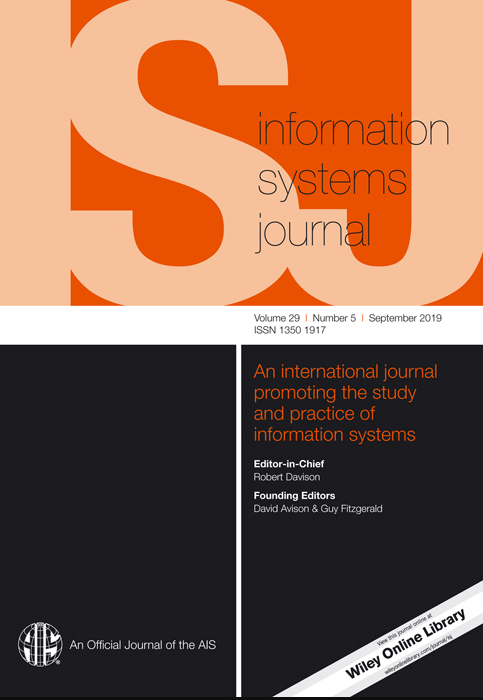
ISJ - volume 29 - 2019 论文列表 |
| 点击这里查看 Information Systems Journal 的JCR分区、影响因子等信息 |
Volume 29, Number 6, November 2019
Lauri Wessel Elizabeth J. Davidson Ana Paula Barquet Hannes Rothe Oliver Peters Herlind Megges
Capturing smart service systems: Development of a domain-specific modelling language.Rocco Xaver Richard Huber Louis Christian Püschel Maximilian Röglinger
Smart service systems: An interdisciplinary perspective.Daniel Beverungen Christoph F. Breidbach Jens Poeppelbuss Virpi Kristiina Tuunainen
Translating evolving technology use into user stories: Technology life narratives of consumer technology use.Jonas Hedman Mads Bødker Gregory Gimpel Jan Damsgaard
Visual storytelling for improving the comprehension and utility in disseminating information systems research: Evidence from a quasi-experiment.Kristijan Mirkovski James E. Gaskin David M. Hull Paul Benjamin Lowry
Deliberate storytelling in big data analytics adoption. Special issue on storytelling and information systems.Volume 29, Number 5, September 2019
Christoph Mittendorf Nicholas Berente Roland Holten
Control and emotions: Understanding the dynamics of controllee behaviours in a health care information systems project.David M. Murungi Martin Wiener Marco Marabelli
A storyteller's guide to problem-based learning for information systems management education.David M. Hull Paul Benjamin Lowry James E. Gaskin Kristijan Mirkovski
An application of goal content theory to examine how desired exercise outcomes impact fitness technology feature set selection. Impact sourcing in India: Trends and implications. Do we care about the Societal Impact of our research?: The Tyranny of the H-Index and New Value-Oriented Research Directions.Volume 29, Number 4, July 2019
Liang Li Kui Du Wei Zhang Ji-Ye Mao
How do development actors do "ICT for development"? A strategy-as-practice perspective on emerging practices in Ghanaian agriculture. ICT-equipped bank boat and the financial inclusion of the riverine population of Marajó Island in the Brazilian Amazon.Luiz Antonio Joia Ricardo Paschoeto dos Santos
Making the developing world a better place with high-impact IS research.Antonio Díaz-Andrade Angsana A. Techatassanasoontorn Carol Ou
Ethical norms and issues in crowdsourcing practices: A Habermasian analysis.Daniel Schlagwein Dubravka Cecez-Kecmanovic Benjamin Hanckel
A critical narrative approach to openness: The impact of open development on structural transformation.Caitlin M. Bentley Arul Chib Sammia C. Poveda
Enabling openness of valuable information resources: Curbing data subtractability and exclusion. Critically studying openness: A way forward.Volume 29, Number 3, May 2019
Douglas P. Twitchell Christie M. Fuller
An interactional view of social presence: Making the virtual other "real".Ulrike Schultze Jo Ann M. Brooks
From composites to factors: Bridging the gap between PLS and covariance-based structural equation modelling. Joining the crowd: The career anchors of information technology workers participating in crowdsourcing. The roles of social identity and dynamic salient group formations for ERP program management success in a postmerger context.Stefan K. Mueller Jan Mendling Edward W. N. Bernroider
Realising platform operational agility through information technology-enabled capabilities: A resource-interdependence perspective. For whom do we write?Volume 29, Number 2, March 2019
Jin P. Gerlach Nicole Eling Nora Wessels Peter Buxmann
Informed collaboration in health care: An embedded-cases study in geriatric telepsychiatry.Sean W. Hansen Janis L. Gogan Ryan J. Baxter Monica J. Garfield
Constructing continuities in virtual work environments: A multiple case study of two firms with differing degrees of virtuality.Aleksandre Asatiani Esko Penttinen
The economics of stock touting during Internet-based pump and dump campaigns. Agility in responding to disruptive digital innovation: Case study of an SME.Calvin M. L. Chan Say Yen Teoh Adrian Yeow Gary Pan
Technostress and social networking services: Explaining users' concentration, sleep, identity, and social relation problems.Markus Salo Henri Pirkkalainen Tiina Koskelainen
Linking information systems and entrepreneurship: A review and agenda for IT-associated and digital entrepreneurship research. The impact of leadership on employees' intended information security behaviour: An examination of the full-range leadership theory.Nadine Guhr Benedikt Lebek Michael H. Breitner
Innovation at work: The relative advantage of using consumer IT in the workplace.Iris A. Junglas Lakshmi Goel Blake Ives Jeanne Harris
The effect of role conflict on self-disclosure in social network sites: An integrated perspective of boundary regulation and dual process model. On serendipity: The happy discovery of unsought knowledge.Volume 29, Number 1, January 2019
Antonio Díaz-Andrade Bill Doolin
Knowledge boundaries in enterprise software platform development: Antecedents and consequences for platform governance.Jens Förderer Thomas Kude Sebastian Walter Schütz Armin Heinzl
The interstitiality of IT risk: An inquiry into information systems development practices.Lars Öbrand Nils-Petter Augustsson Lars Mathiassen Jonny Holmström
Conceptualising the link between information systems and resilience: A developing country field study.Richard Heeks Angelica V. Ospina
Cognitive-affective drivers of employees' daily compliance with information security policies: A multilevel, longitudinal study.John D'Arcy Paul Benjamin Lowry
The technostress trifecta - techno eustress, techno distress and design: Theoretical directions and an agenda for research. The art of vivacious variance.
